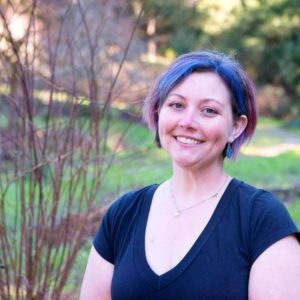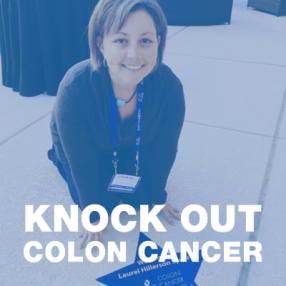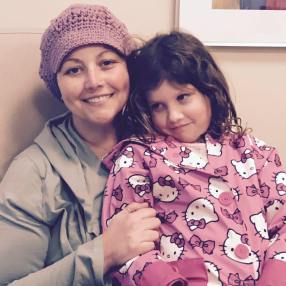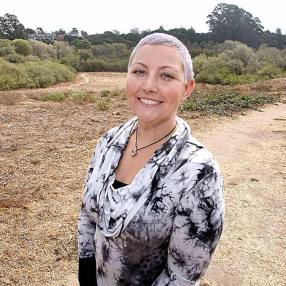Laurel Interviewed by Colon Cancer Alliance, April 2017

Laurel Hillerson-Spear has gone through 50+ rounds of chemo after showing symptoms at age 31. She is currently enrolled in a clinical trial several hours from her home in California. Last year, she started an organization help young adults and their families after a cancer diagnosis called Fiona’s Family House and has been a longtime Colon Cancer Alliance Buddy and volunteer. She was gracious enough to take time of out her busy schedule as a mom and advocate to share her experience with clinical trials.
Can you share a few sentences about your journey, from symptoms to diagnosis and treatment?
In February of 2014, at the age of 31, I began having severe vaginal pain, strange nerve issues in my pelvis, and severe pain in my lower right back. After going back and forth with my gynecologist, she fina lly ordered a CT scan in May of 2014. I had just turned 32, and the scan showed seven masses on my liver. I was referred to a gastroenterologist (yet told she was a liver specialist), who ordered a colonoscopy. The test revealed a large mass in my rectum that had grown through the rectal wall and was entwined in my vaginal nerves. On May 29, 2014 I met with an oncologist who told me I had stage IV rectal cancer and that I was inoperable at that time.
lly ordered a CT scan in May of 2014. I had just turned 32, and the scan showed seven masses on my liver. I was referred to a gastroenterologist (yet told she was a liver specialist), who ordered a colonoscopy. The test revealed a large mass in my rectum that had grown through the rectal wall and was entwined in my vaginal nerves. On May 29, 2014 I met with an oncologist who told me I had stage IV rectal cancer and that I was inoperable at that time.
Over the past three years, I’ve received 50+ rounds of various combinations of chemo. Today, I am currently enrolled in the Azacitidine, Pembro, and Epacadostat trial through the City of Hope. I have just finished my 3rd round.
How did you learn about clinical trials?
I had known about clinical trials from the start. I’m not sure from where, but probably just from other people in my life who have had cancer. I learned more about them, including what the different levels meant through Facebook groups like Blue Hope Nation and COLONTOWN.
 Why is participating in clinical trials so important?
Why is participating in clinical trials so important?
To be honest, I am not optimistic about this trial. I understand that adult cancer trials have a very low success rate. However, I also know that I am alive today, after 50+ rounds of chemo, because someone 20 years ago did a clinical trial that got the drugs I am on approved. I believe it’s my res ponsibility to help progress science and available medications for the future. Without trial participants, we will never eradicate this horrible disease.
What would you say to someone who is hesitant to consider clinical trials as a treatment option?
I think the way we portray clinical trials in the media or common rhetoric is that participants are guinea pigs with untested drugs. The reality is that there is a rigorous pre-trial process that happens before trials are approved for human subjects. I am in a phase 1 trial and was subject number 2, meaning I was the second human ever to get this combination of drugs. However, these drugs have been used in other ways and the common side effects are known. Subjects are not guinea pigs, they are helping to advance treatment options.
W hat has been the most surprising about being a part of a trial?
The level of scrutiny that happens at each phase of the process. Everything is double and triple checked. I had to wait hours on my first day because one of my daily medications raised red flags with the pharmacist. The trial monitor and the physician overseeing the trial was fine with the drug, but the pharmacist was not. They had to work it out. Also, there is a lot more monitoring with the trial, which I didn’t expect. I have to get regular EKG’s and the lab work is much more extensive.
What would be your #1 piece of advice for someone newly diagnosed?
Use the known options for treatment but keep up on new and emerging treatments. Research clinical trials, know the tools that are out there to learn about trials, but don’t drive yourself nuts trying to understand everything. It’s always good to have a plan B. When you are running out of known treatment options, start discussing what trials might be a good plan B for you.
If your oncologist isn’t willing to support you and help with the search, it may be time to find one who is supportive. Meet with trial docs before you need them Get on their radar and don’t let them forget you
